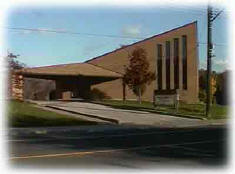Affirming
A sermon preached by the Rev. Alan W. Hall
The Eighth Sunday of Easter, May 4, 2008
St. Mark’s United Church
Matthew 15: 21 - 28
In the
gospels of Mark (7: 24 – 30) and Matthew (15: 21 – 28) there is a story of
Jesus, while in the region of Tyre, what is now southern Lebanon, is
petitioned by a woman to exorcise a demon from her daughter.
In
Mark’s version the woman is described as Greek. In Matthew’s version she is
identified as a Canaanite, those ancient enemies of Israel who had to be
eradicated from the Promised Land when they arrived home from exile in Egypt.
In either case, the woman is not Hebrew, not one of “them”.
She is
persistent. Her view of Jesus is not that that the gospel writers are
constructing: she sees him as one with the power to perform wonders, like
other powerful magicians in her age. She dogs them. “Jesus, chase the
demon out of my daughter!” At one point Matthew writes that the disciples
came to Jesus complaining about her: “Get rid of her. She’s badgering
us.” [Matthew 15: 23].
Jesus’
response to her is harsh. He makes it clear that the message he brings is for
those of the house of Israel not for “dogs” like her. The early Jesus
followers were Torah-abiding Jews. The only way you could join them was to
become Jews like them and follow the laws of the Torah as any good Jew does.
“Inclusive” was not a part of their mission statement. It is Paul who
changes the rules to make room for Gentiles. Some have said that because of
this, and this alone, Christianity, as he reformulates it, not only survives,
but thrives.
The
Gospel writers are beginning to reflect Paul’s directions. And so the story
begins to turn. The woman replies to Jesus’ harsh words with a clever
retort: “Yes, but even the dogs under the table get to eat the scraps
dropped by the children.” [Mark 7: 28]. Back and forth, no doubt, they
went until, in the end, they see Jesus embracing her, affirming her faith,
and, even from a distance, restoring the woman’s daughter to wholeness.
Jesus
is changed by this woman who is so different than he is. Both Mark and
Matthew want us to know that this change is good and we, too, should be open
to the faith, the lives, and the needs of those who are different than us.
And in doing so, the community is richer, stronger, larger.
No
doubt becoming an officially designated Affirming Congregation will
generate discomfort for some, as we see the disciples discomforted in that
gospel story. Others may well choose not to come to St. Mark’s because, to
use the story’s word, Christian faith is not for “dogs” like those who
are gay, lesbian, transgender or bisexual. We will be less without these
people who choose not be a part of this community of faith.
But I
do think that, as we see in this story, there is much to be gained by standing
up and saying clearly that in this community of faith all are welcome, all
have a place, all will be respected and all will be safe. We will be more for
doing so. We will be a richer, more dynamic place.
A story
from our lives together.
At Bill
Corrick’s funeral last week I spoke about a time in my life when every thing I
thought I knew and trusted was proving to be less than the test. In the midst
of this time Bill walked through the crowd of all my doubts and fears and,
before every one of them, embraced me. He wrapped his arms around me in a
full body contact hug and then stood there, his hand gripping my shoulder.
His love and his affirmation in that moment restored wholeness to my spirit.
That
time was during the tense, anger-filled months following the 1988 General
Council that decided that The United Church of Canada would not prohibit gay
and lesbian members from being considered for ordered ministry. It was also a
difficult time in our congregational life. We were facing many challenges
about which many members held genuine and well-founded concern. For a small
number, however, the larger issue was my continued presence, as a minister who
is gay, in the congregation. One went so far as to challenge the legitimacy
of my ordination.
It was
in the midst of this storm that Bill very publicly embraced me.
In
doing so, he set a new direction for this congregation, one that resonated
with the larger and better spirit of this congregation. With him, and with
the leadership of others who stood and took public positions, we turned to
that Spirit, we found reason to address and resolve the more pressing
challenges before us, and we built a congregation that today can legitimately,
honestly, and faithfully say that it is progressive, inclusive and
life-affirming.
Becoming an Affirming Congregation is to embrace that Spirit that has
brought us life and continues to lead us. It is the next step into what is an
exciting, challenging, and faithful future where we will continue to grow in
diversity, wonder, and grace.
May it
be so. Amen.




